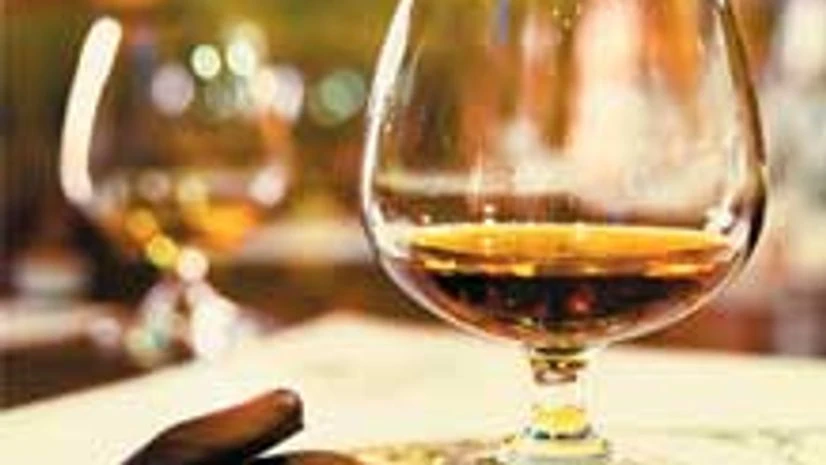Tilaknagar Industries, among the largest Indian liquor companies, has been recently in the news for fights over the rights to its iconic brand - Mansion House. Though Mansion House is a leader in the brandy market, and is produced and distributed by Tilaknagar in India, another Indian major, Allied Blenders and Distillers (ABD) has staked a claim to the brand-name rights.
In the 260-million case (a case comprises 9 litres) Indian-made-foreign-liquor market, brandy holds a share of 16 per cent, rum 20 per cent and white spirits 5 per cent. Whisky leads with 59 per cent. Mansion House, with a presence in 17 states, has achieved sales of 5 million cases in FY-14. It has been growing at 11 per cent over the last four years. It enjoys a share of 35 per cent in premium brandies.
But following a row that is yet to be sorted out by the courts with Mansion House's owner, the Netherlands-based Herman Jansen Beverages, Tilaknagar's hold over the brand has come under a cloud. ABD's spanner in the works has only made it more difficult. But Tilaknagar is not about to cede ground. After all, brandy sales has contributed about 55 per cent to its Rs 806-crore revenue in FY-14, and Mansion House is its piece de resistance.

Tilaknagar's overall sales in FY-14 has increased 17 per cent to 16.13-million cases, out of which 8.8-million cases were of brandy. Besides Mansion House, it sells two million-case brandy brands - Brigadier No 1 and Vorion No 1 - and also Courrier Napoleon.
Santosh Kanekar, the former marketing head at Diageo India, says, "Unlike other Asian countries where brandy, or more specifically cognac, sells more than whisky, whisky lords it over in India. Brandy is a preferred tipple in the south. Only a few brands enjoy a strong customer loyalty and Mansion House is one of them."
| Increasing brandy’s appeal |
|
Tilaknagar wants to grab a bigger pie in brandy. "We find it amusing that phrases such as a 'cold climate' have been used to suggest fertile conditions for brandy to thrive. These are myths. Brandy is a year-round drink," he says. Last year, Tilaknagar had launched Mansion House Silk, a super-premium brandy, in Kerala.
Mansion House has a market share of 56 per cent in Andhra Pradesh, 78 per cent in Kerala, 97 per cent in Karnataka, 42 per cent in Tamil Nadu and 78 per cent in Pondicherry (FY-13). Dahanukar wants to expand the brandy business across the country.
Tilaknagar, though, might have to reach out to the trade first. "The fight for ownership may affect the supply of the product and that would have an impact as it is a fast-moving item. The latest International Wine and Spirits Research says that there is a decline in Mansion House numbers. But ditto for the other popular brandy brand, McDowell Brandy. However, going forward, distributors would be keen to be reassured of the supply of the product," Kanekar says. Tilaknagar has reported a decline of 4 per cent in its profits (after tax) in FY-14, though net sales value has grown 10 per cent.
In 1987, Tilaknagar had entered an agreement with UTO, now Herman Jansen, by which UTO had ceded ownership rights of Mansion House and Savoy Club trademarks to Tilaknagar. But later, Herman Jansen accused Tilaknagar of breaching the terms of the agreement and sued the Mumbai-based company in Indian courts. The Bombay High Court rejected Herman Jansen's claims and ruled in favour of Tilaknagar. Herman Jansen has appealed the order and the final verdict is yet to come.
"We are the owners of the trademarks Mansion House and Savoy Club for the Indian territory. In 1987, vide an agreement, UTO had ceded these marks to us. The Mumbai High Court, vide its judgement of December, 2011, has inter-alia upheld that these marks were indeed ceded to Tilaknagar in 1987," Dahanukar says. However, the Kishore Chhabria-owned ABD, after joining hands with Herman Jansen, claims it has signed an agreement with it to own half of Mansion House's India brand-right.
But Dahanukar insists that UTO lawyers have confirmed that they have not sold any interest to ABD. "However, any changes in ownership of UTO does not factually change the merits of our case and also doesn't alter the situation on the ground," he says.

)
